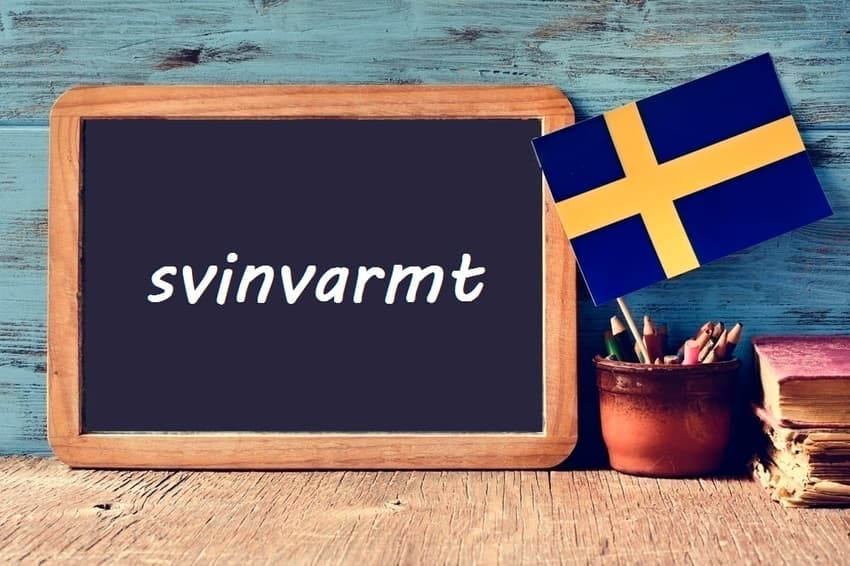Swedish word of the day: svinvarmt

Today's Swedish word of the day is brought to you courtesy of the heatwave currently sweeping the country.
Svinvarmt literally translates as 'pig hot', and it's used to mean 'very hot' in reference to temperature.
It's similar to the expressions mycket varmt or jättevarmt (both meaning 'very hot'), but svin- is a much more colloquial or informal prefix than jätte-, so you could also translate it as English 'bloody'.
Beginner Swedish language learners might be confused because varm looks like the English word 'warm'. They share linguistic roots, but in English 'warm' is less intense. For example, compare hot chocolate and varm choklad, whereas 'warm chocolate' in English sounds more like a chocolate bar that's started to melt in the sun.
We've written svinvarmt ending in 't', because you'll most likely hear it in a sentence like 'oj det är svinvarmt idag!' (wow, it's boiling hot today!), in which case svinvarmt ends in a 't' to agree with det. Like most other Swedish adjectives, and like the adjective varm itself, svinvarm is used with a final 't' when it describes an 'ett' word, and without it when describing an 'en' word. For example: duschen var svinvarm (the shower was boiling hot), but vattnet var svinvarmt (the water was boiling hot).
So what have pigs got to do with it?
I'm delighted you asked.
An English-speaker might make a link between the colloquial phrase 'sweating like a pig', but the svin here doesn't really have anything to do with pigs as such.
Svin is simply being used an intensifier, like jätte- (which literally means 'giant' but usually means 'very'), to emphasize the adjective it's combined with.
Svin can be used as an intensifier on lots of different adjectives. As well as svinvarmt, another common one is svinkallt (very cold), and you might also hear words like svinbra (very/bloody good), svinintressant (really interesting) or svintråkig, for example.
When used on its own to talk about another person, the word svin is an insult, most often used about men: han är en svin means 'he is a swine'. But when combined with an adjective, the prefix svin- doesn't necessarily have any negative connotation at all.
Examples
Det var svinvarmt i går så vi tog ett dopp
It was roasting hot yesterday so we went for a dip
Vi satt i ett svinvarmt rum
We sat in a boiling hot room
Do you have a favourite Swedish word you would like to nominate for our word of the day series? Get in touch by email or if you are a Member of The Local, log in to comment below.
Comments (1)
See Also
Svinvarmt literally translates as 'pig hot', and it's used to mean 'very hot' in reference to temperature.
It's similar to the expressions mycket varmt or jättevarmt (both meaning 'very hot'), but svin- is a much more colloquial or informal prefix than jätte-, so you could also translate it as English 'bloody'.
Beginner Swedish language learners might be confused because varm looks like the English word 'warm'. They share linguistic roots, but in English 'warm' is less intense. For example, compare hot chocolate and varm choklad, whereas 'warm chocolate' in English sounds more like a chocolate bar that's started to melt in the sun.
We've written svinvarmt ending in 't', because you'll most likely hear it in a sentence like 'oj det är svinvarmt idag!' (wow, it's boiling hot today!), in which case svinvarmt ends in a 't' to agree with det. Like most other Swedish adjectives, and like the adjective varm itself, svinvarm is used with a final 't' when it describes an 'ett' word, and without it when describing an 'en' word. For example: duschen var svinvarm (the shower was boiling hot), but vattnet var svinvarmt (the water was boiling hot).
So what have pigs got to do with it?
I'm delighted you asked.
An English-speaker might make a link between the colloquial phrase 'sweating like a pig', but the svin here doesn't really have anything to do with pigs as such.
Svin is simply being used an intensifier, like jätte- (which literally means 'giant' but usually means 'very'), to emphasize the adjective it's combined with.
Svin can be used as an intensifier on lots of different adjectives. As well as svinvarmt, another common one is svinkallt (very cold), and you might also hear words like svinbra (very/bloody good), svinintressant (really interesting) or svintråkig, for example.
When used on its own to talk about another person, the word svin is an insult, most often used about men: han är en svin means 'he is a swine'. But when combined with an adjective, the prefix svin- doesn't necessarily have any negative connotation at all.
Det var svinvarmt i går så vi tog ett dopp
It was roasting hot yesterday so we went for a dip
Vi satt i ett svinvarmt rum
We sat in a boiling hot room
Join the conversation in our comments section below. Share your own views and experience and if you have a question or suggestion for our journalists then email us at [email protected].
Please keep comments civil, constructive and on topic – and make sure to read our terms of use before getting involved.
Please log in here to leave a comment.